Objectes multimèdia amb l’etiqueta: Unitat Transversal de Gestió del Campus de Vilanova i la Geltrú
Resultats de la cerca
[SC 2013] Aigua i sanejament bàsic a les comunitats empobrides
Accés obert
19 de nov. 2013
Conferència impartida dins el cicle de xerrades de la Setmana de la Ciència 2013 a l'EPSEVG.
Mostra tres perspectives diferents sobre la problemàtica de l'aigua i sanejament a comunitats empobrides.
Des de la recerca, a càrrec de Ricard Giné: Visió general de context, on es descriu la problemàtica de l'accés als serveis bàsics en països empobrits.
Des de la institució, a càrrec de Daniel López: Visió general del CCD de la UPC i la seva aposta per transformar realitats desde la universitat.
Des de l'estudiant, a càrrec d'estudiants de la ETSECCPB i vinculats al Centre de Cooperació i Desenvolupament de la UPC: Apropar-se a la realitat a través d'un projecte concret al Nepal.
Mostra tres perspectives diferents sobre la problemàtica de l'aigua i sanejament a comunitats empobrides.
Des de la recerca, a càrrec de Ricard Giné: Visió general de context, on es descriu la problemàtica de l'accés als serveis bàsics en països empobrits.
Des de la institució, a càrrec de Daniel López: Visió general del CCD de la UPC i la seva aposta per transformar realitats desde la universitat.
Des de l'estudiant, a càrrec d'estudiants de la ETSECCPB i vinculats al Centre de Cooperació i Desenvolupament de la UPC: Apropar-se a la realitat a través d'un projecte concret al Nepal.
[SC 2013] Aigua i energia : energia i aigua
Accés obert
18 de nov. 2013
Conferència impartida dins el cicle de xerrades de la Setmana de la Ciència 2013 a l'EPSEVG.
L’energia i l’aigua estan units estretament. No només perquè l’energia és un component essencial en moltes de les fases de la gestió integral del cicle de l’aigua, sinó també perquè l’aigua és protagonista d’alguns aspectes de la generació de l’energia.
L’energia i l’aigua estan units estretament. No només perquè l’energia és un component essencial en moltes de les fases de la gestió integral del cicle de l’aigua, sinó també perquè l’aigua és protagonista d’alguns aspectes de la generació de l’energia.
Diseño para todos : capacidad, funcionamiento y uso de los entornos
Accés obert
11 de nov. 2013
La ponència, emmarcada dins de l'itinerari de disseny centrat en l'usuari del Grau de Disseny Industrial està dirigida a tot l'estudiantat, professionals i interessats i interessades en el disseny universal per a persones.
Realitat augmentada. Un nou medi?
Accés obert
31 d’oct. 2013
Lliçó pràctica sobre la realitat augmentada: des dels seus inicis fins a reflexionar sobre el futur d'aquesta tecnologia.
Disseny + Enginyeria
Accés obert
24 d’oct. 2013
L’empresa Ànima, formada per un col·lectiu multidisciplinari de dissenyadors, enginyers i experts en màrqueting i innovació, és una de les firmes joves que contribueix a mantenir el posicionament internacional de Barcelona en el sector dels serveis de disseny. Un treball rigorós i sistemàtic, oferint servies d’innovació basats en l’acurada aplicació del disseny, han permès a Ànima construir una bona cartera de clients, i amb un estil de creació propi, contribuir a crear una extensa gamma de productes per empreses d’Europa i d’Àsia.
Inauguració del curs acadèmic a l'EPSEVG 2013-2014
Accés obert
10 d’oct. 2013
El Campus de la UPC de Vilanova i la Geltrú dóna la benvinguda oficial al curs 2013/2014 en l’acte d’inauguració que se celebrà dijous 10 d’octubre a les 12.30h a la sala d’Actes de l’EPSEVG.
La lliçó inaugural ‘La força dels valors: es porta DINS’ anà a càrrec de Ramon Sanclimens Piñol, que parlà de com els valors de la solidaritat, generositat i empatia són claus en la societat actual.
A l’acte es lliuraren els premis als millors expedients acadèmics dels estudiants titulats en el curs 2012/2013. El Col·legi d’Enginyers Tècnics Industrials de Vilanova i la Geltrú (CETIVG) lliura els premis Joan Roset i Ventosa als millors expedients de les enginyeries d’àmbit industrial, el Col·legi Oficial d’Enginyers Tècnics i pèrits de Telecomunicació de Catalunya (COETTC) a l’Enginyeria Tècnica en Telecomunicació, EVERIS a l’Enginyeria Tècnica en Informàtica de Gestió i la Caixa d’Enginyers al millor expedient acadèmic de l’Enginyeria en Automàtica i Electrònica Industrial.
A continuació, l’EPSEVG premià als guanyadors del concurs Projecte de Fi de Carrera 2012/2013, i s’agraí la dedicació del personal universitari que compleix 25 anys de dedicació al campus i al personal que s’ha jubilat al llarg del curs passat.
L’acte fou presidit pel director de l’EPSEVG, sr, Frederic Vilà, l’alcaldessa la de ciutat, sra. Neus Lloveras, i el vicerector de Formació Permanent la Universitat Politècnica de Catalunya. BarcelonaTech (UPC), sr. Joan Majó.
La lliçó inaugural ‘La força dels valors: es porta DINS’ anà a càrrec de Ramon Sanclimens Piñol, que parlà de com els valors de la solidaritat, generositat i empatia són claus en la societat actual.
A l’acte es lliuraren els premis als millors expedients acadèmics dels estudiants titulats en el curs 2012/2013. El Col·legi d’Enginyers Tècnics Industrials de Vilanova i la Geltrú (CETIVG) lliura els premis Joan Roset i Ventosa als millors expedients de les enginyeries d’àmbit industrial, el Col·legi Oficial d’Enginyers Tècnics i pèrits de Telecomunicació de Catalunya (COETTC) a l’Enginyeria Tècnica en Telecomunicació, EVERIS a l’Enginyeria Tècnica en Informàtica de Gestió i la Caixa d’Enginyers al millor expedient acadèmic de l’Enginyeria en Automàtica i Electrònica Industrial.
A continuació, l’EPSEVG premià als guanyadors del concurs Projecte de Fi de Carrera 2012/2013, i s’agraí la dedicació del personal universitari que compleix 25 anys de dedicació al campus i al personal que s’ha jubilat al llarg del curs passat.
L’acte fou presidit pel director de l’EPSEVG, sr, Frederic Vilà, l’alcaldessa la de ciutat, sra. Neus Lloveras, i el vicerector de Formació Permanent la Universitat Politècnica de Catalunya. BarcelonaTech (UPC), sr. Joan Majó.
Sessió acollida nous estudiants EPSEVG : Curs 2013/2014
Accés obert
23 de jul. 2013
Sessió d'acollida o de portes obertes que l'EPSEVG ofereix les persones que properament iniciaran els seus estudis en el centre.
[Innova Days 2013] Sense4Care: Experiencia en la creació d’Spin off en tecnología asistencial
Accés obert
28 de juny 2013
[Innova Days 2013] Presentació de les I Jornades d’Innovació Docent, Qualitat i Emprenedoria (INNOVADAYS 2013)
Accés obert
27 de juny 2013
Atenent a la missió del centre EPSEVG de fomentar la formació d’enginyers/eres en el segle XXI, les Jornades d’Innovació, Qualitat i Emprenedoria presenten el repte de desplegar valors com la innovació docent, la gestió de la qualitat i la emprenedoria de forma quotidiana en la vida universitària.


![[SC 2013] Aigua i sanejament bàsic a les comunitats empobrides](/uploads/pic/series/6040aa649e8fe0002b5e5184/video/6042743b9e8fe0115069e6c9/210305200348.jpg)
![[SC 2013] Aigua i energia : energia i aigua](/uploads/pic/series/6040aa649e8fe0002b5e5184/video/604274299e8fe011593d23a9/210305195852.jpg)
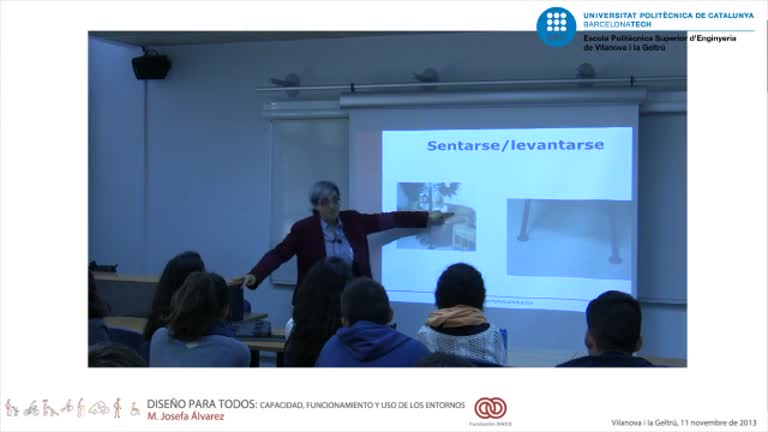
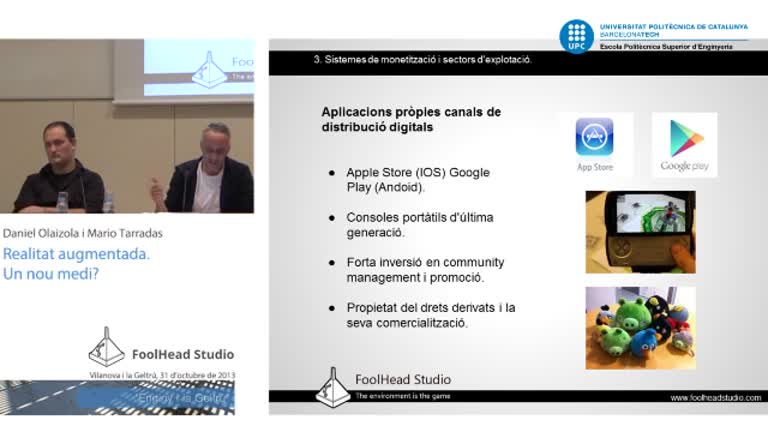
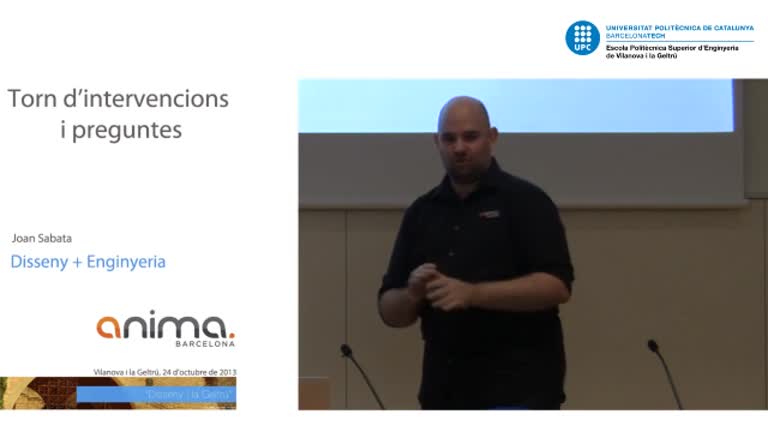
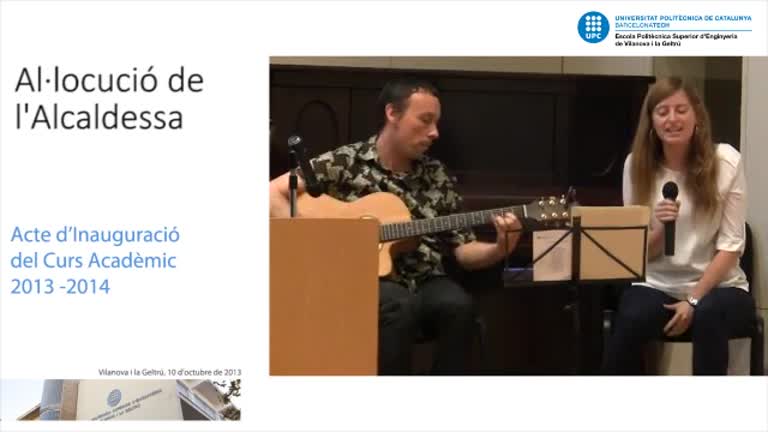
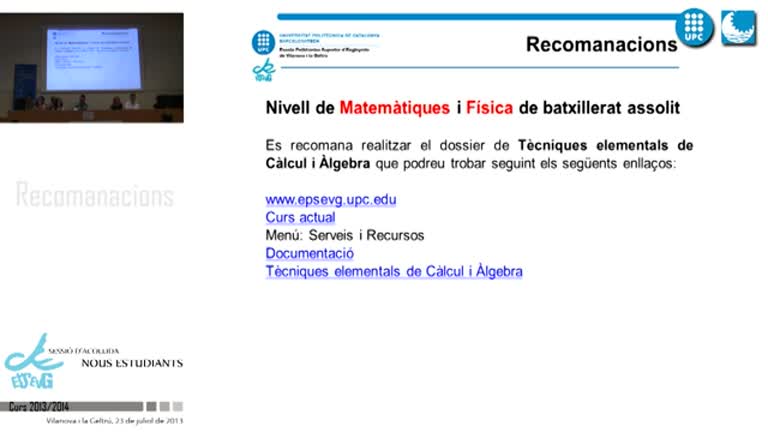
![[Innova Days 2013] The Trans-Atlantic Project: innovations in multilingual/multicultural/multidisciplinary collaborative learning](/uploads/pic/series/6040bd459e8fe0003f5a4fbd/video/6042f0969e8fe01d6327099a/21030640700.jpg)
![[Innova Days 2013] Sense4Care: Experiencia en la creació d’Spin off en tecnología asistencial](/uploads/pic/series/6040bd459e8fe0003f5a4fbd/video/6042f0859e8fe01d5925b7b8/21030640635.jpg)
![[Innova Days 2013] Projecte Design Beach](/uploads/pic/series/6040bd459e8fe0003f5a4fbd/video/6042f0749e8fe01d5925b7b3/21030640609.jpg)
![[Innova Days 2013] Emprendimiento y diseño, la experiencia en HP](/uploads/pic/series/6040bd459e8fe0003f5a4fbd/video/6042f05a9e8fe01d5925b7a6/21030640336.jpg)
![[Innova Days 2013] Presentació de les I Jornades d’Innovació Docent, Qualitat i Emprenedoria (INNOVADAYS 2013)](/uploads/pic/series/6040bd459e8fe0003f5a4fbd/video/6042f0699e8fe01d5925b7ae/21030640311.jpg)